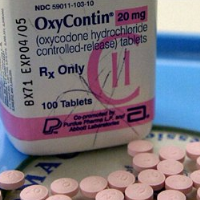U.S. Doctors Prescribe Opiate Painkillers at Twice the Rate of any other Country…and 500,000 Veterans are Dependent

Doctors in the United States lead the world in prescribing opioid analgesics, or opiate pain relievers (OPR). According to a report from the Centers for Disease Control and Prevention (CDC), U.S. physicians write 82.5 prescriptions for OPRs for every 100 persons in the country.
Expressed another way, there are 40,000 daily doses of OPRs consumed here for each million inhabitants per day. The second leading consumer of OPRs, according to a United Nations report, is Canada with 20,000 daily doses per million. By comparison, Mexico consumes only 85 daily doses per million inhabitants.
Many of these OPRs in the United States are apparently being consumed by veterans. According to a report by Human Rights Watch (HRW), more than 1 million vets take OPRs, half of them chronically. At least initially, these drugs are often prescribed by military doctors. In 2010, about 76,000 service members, about 14% of the force, were prescribed OPRs. The drug of choice in 95% of cases was oxycodone. Some of the prescribing has been done haphazardly; a report last year by the VA showed that some OPR prescriptions were being renewed without doctors seeing the vets.
The heavy prescribing of OPRs is resulting, not surprisingly, in overdoses. Patients at Department of Veterans Affairs (VA) hospitals die from overdoses at a rate twice that of the general population. As a result, the VA has enacted new policy guidelines for OPR prescriptions and in 2013 started an Opioid Safety Initiative at eight clinics in the Minneapolis area. Since the program was started, there have been 50% fewer high-dosage opioid prescriptions written there.
The HRW report also cited a need for naloxone kits to be distributed to OPR users. Naloxone is a drug that can counteract the effects of an opioid overdose when used quickly. Kits are given to OPR users and sometimes their families to be used in case of emergency.
There is also a need for more programs to wean OPR users in the veteran community off the drugs. “Only one of three patients at the VA who need methadone or buprenorphine [treatments for addiction] is getting it,” Megan McLemore, a senior researcher at Human Rights Watch and the author of the report, said. “We found that 38,000 VA patients don’t have access to the most effective treatment for their condition, and the VA needs to ensure that its own policies are implemented to make these medications available.”
-Steve Straehley
To Learn More:
Availability of Internationally Controlled Drugs: Ensuring Adequate Access for Medical and Scientific Purposes (International Narcotics Control Board) (pdf)
U.S.: Half a Million Drug-Dependent Veterans (Human Rights Watch)
No Time to Waste (by Megan McLemore, Human Rights Watch)
Doctors are Primary Source of Narcotic Painkillers for Chronic Drug Abusers in U.S. (by Noel Brinkerhoff, AllGov)
V.A. Doctors Renewed Opiate Painkillers for Patients They Never Saw (by Noel Brinkerhoff, AllGov)
- Top Stories
- Unusual News
- Where is the Money Going?
- Controversies
- U.S. and the World
- Appointments and Resignations
- Latest News
- Trump Orders ICE and Border Patrol to Kill More Protestors
- Trump Renames National Football League National Trump League
- Trump to Stop Deportations If…
- Trump Denounces World Series
- What If China Invaded the United States?






Comments